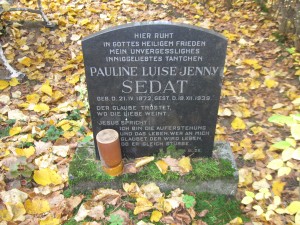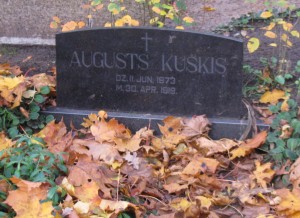Was one of your ancestors an early Latvian migrant to the United States that settled in Wisconsin in the late 19th and early 20th century (roughly between 1885 and 1910)? More specifically the rural northern county of Lincoln? Were they a member of the Latvian community in Gleason or the surrounding area?
If so, I want to hear from you! I’m doing a research project on the Wisconsin colony of Latvians for the Latvians Abroad Museum and Research Centre this spring, and am looking to make contacts amongst the descendants of these Latvians, collect stories, and so on.
Using the 1910 US Federal Census, I was able to formulate this list of Latvians who were living in the area – specifically the townships of Birch, Russel and Schley – in 1910. I don’t expect that it is exhaustive (nor do I expect that the spellings are all correct, but I’m using what was in the Census documents and have suggested alternatives), so even if your ancestor is not on this list, but lived in the area at that time – please contact me! If you know anyone who has Latvian roots in this area, pass this information along to them!
Wisconsin Latvians, as per 1910 US Federal Census:
ABROY, Mike
APPAS, Matilda
ARDER, Eduard, Dora, William, Lillian
BATE, Theodore, John, Martin, Jacob, Theodore, John, Julia
BAUMAN, John, Amelia, Pauline, Albert, Anna, Roland (Baumann, Baumanis)
BENISH, Martin, Lizzie, Amelia, Erna, Ina, Harry
BERKOSKI, William, William
BOLDAR, George, Dorthea, Richard, Ida, Armine
BREEDIS, Hans, Minnie, Hans (Briedis)
BRIGSMA, John, Corline, Harry, Alvine, George, Lizzie
BRIKOWSKI, John, Anna
DAGEN, Martin, Mary, Albert, Adolph, William, Lena
EGLET, Nicholin, Minnie, Charles (Eglit, Eglītis)
ESSALING, Ernest, Lizzie, Ernest (Esaliņš)
FRIEDENFELD, Fred, Amelia, Vera, Anna, Carl
GOTOFF, John, Minnie, Augusta
GUNTIS, Tom
GUSTIN, Eddie (Gustiņš)
GUTMAN, Jacob, Annie (Gutmann, Gutmanis)
HALLAKIS, William, Mary, Oscar
HOHN, John
HOLSTIN, Charles
INKOS, Janis
JESLAVITZ, George, Minnie, Lizzie, Anna, August, Albert, Amelia, Hans, Ava (Jeslavics, Jeslawitz)
JOHNSON, Charles, Margareta, May (Janson, Jansons)
KANAPKA, William
KAULIN, Eduard (Kaulen, Kauliņš)
KIRSH, Fredie (Kiršs)
KLEINBERG, Sam, Jule, Pauline, Fred, Christ
KRAUKLIN, Julius, Lizzie (Kraukliņš)
KRAUKLIS, George, Louisa, Julie, Lena, George, Minnie, Albert
KRISCHE, David, Wilhelmina, Helen, Anna
KRISH, Martin, Minnie (Krišs)
KURWITZ, Jacob, Anna, Elmer (Kurvics, Kurvitz, Kurvītis))
LUHS, Otto, Louisa, William
LUTZMAN, Hans, Lena, Charles, Mary
MANDICK, John, Kate, Alma, Joe, Mary, Fred, Christ, Emilia (Mondeik, MandeiÄ·is)
MOLLER, Theodore, Anna, Theodor, Minna, Irene, Theodor, Delphan
ORMAN, Fritz, Carrie, Christ, John, Anna, Lena, Anna
OSLIN, John
OSOLIN, John, Anna, John, Willie, Mildred, Albert (Osoling, Ozolin, Ozoliņš)
PETERSON, John, Mary, Mary, Carrie, Harry (PÄ“tersons)
PETRES, Christ, Katie, Christ, Selma
PETROWSKI, Joe, Anne (Petrovski, Petrovskis)
PIKKE, Bradik, Anna, Fritz, Anna
PUTNESS, Charles, Julia, Olga, Christ
RADONUH, Joseph, John
REINSON, Peter, Alice, Pauline, Alvine, Eduard, Anna (Reinsons)
ROMAN, William
ROMOWSKI, Michael (Romovski, Romovskis)
RONIS, John, Annie, Amelia, Charles, George, Jack, Annie, Johan
SACKMAN, Otto, Katherine, Ava, Sam
SARIN, John, Carathass, Charles, Martin, Bertha (Sarrin, Sarring, Saring, Zarin, Zariņš)
SAYS, Henry, Leba, Mary, Julia, Mike
SCHAUMAN, George
SCHNARSKY, Joseph, Castince, Joseph, Ferdinand
SCHULTZ, George, Mary, Lena, Anna, John, Elsie (Å ulcs)
SEAKMAN, Edward
SELTMAN, Charlie, Julie (Seltmann, Zeltmanis)
SEYES, Julia
SMEDUL, George, Louisa, William, Pauline (Smedull, Smedulis)
SOMMIE, Albert, Gust, Metleena, Jacob, Albert
SPROGIS, Emilia, August, Emily, Nathalie, Greta
STAHL, Nick, Margarete
STALLIKAS, George, Mary, Mary, Theodore, Anna, George
STEIN, Hans, Amelia, Hans, Fritz, Elsie, William, Lizzie, August, Leona, Pauline, Emma, Fritz, Amelia, Olga, Lillian, Oswald
SUMMER, Anton, Amelia
SUTTE, Martin, Anna, Amelia, George, Jacob, Mary, Mildred, John, Anna (Zute, Zutis)
SWIRBULL, John, Mike (Zvirbulis)
TAUBE, John
TRIEMAN, Jacob, Anna, Alvina
WELDOM, Charles, Anna, Rudolph, Alfred, Chris, Eva, Amelia, Albert
WENZSLOW, Hans, Amilie, Amilie, John, Olga, Theodore, Nettie
ZAKIS, August
ZEELAW, Woldmar (Cielavs)
ZEMEL, Peter, Anna, Hermine (Ziemelis)
ZEROL, Martin, Leona, Fred, Augusta (Cerulis)
If one of these people is your ancestor, or you have other Latvian ancestors from turn-of-the-century Wisconsin, please comment here, or email at  (image to prevent spam, please type it into your email program).
(image to prevent spam, please type it into your email program).



 (image to prevent spam, please type it into your email program).
(image to prevent spam, please type it into your email program).